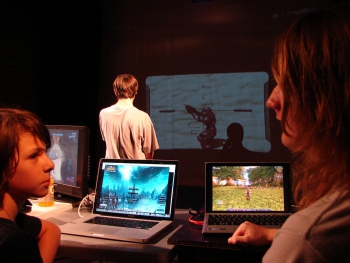Machinima is all the rage these days. That’s when people use footage from
video games combined with voiceovers to tell stories. Unfortunately, very few
people are doing it well. For
every hit like Red Versus Blue there are
hundreds of failed attempts. Such
is the case with a live Machinima theatrical piece called Romeoo and
Julietet. It’s a production of "Romeo and Juliet" performed live in
World of Warcraft.
The producers of the show have set up laptops in a theater
in Brooklyn, with a projection screen showing the in-game events. The players control World of
Warcraft characters all named after
characters in Shakespeare’s play, and they type out their dialogue in the game
while a cast of recorded voice actors recite the lines for the audience in the
theater. All of this is done live
in World of Warcraft, and anyone
playing the game can watch the performance live in-game at the same time the
audience in the theater is watching.
I feel like the producers of Romeoo and Julietet have their hearts in the right place; they’re trying
to add some art and literature to the World of Warcraft, and also introduce new technology to live
theater. Technologically, the show
works well; the players get their characters around the game on cue, and the
recorded dialogue is delivered on time.
There’s a lot that could have gone wrong with such a show from a tech
perspective and the director Eddie Kim managed to pull it off. Unfortunately in most other
regards the project is badly executed.
First, from a theatrical point of view, the show uses a
heavily edited version of the play.
Over two thirds of the script is cut out to make a one-hour running
time. Given the inherently silly
nature of the project, one of Shakespeare’s comedies would certainly have been
a better choice (it’s hard to take this tale of tragic lovers seriously when
Orcs are doing their funky dance moves).
Also, the performers and their laptops are set up on stage with the
screens facing the audience. While
this does prove that the show is being done live, it’s also very
distracting.

Then there is the use of recorded voiceovers. Having a live
cast on stage is what theater is all about, and using recorded sound clips
combined with video footage makes the show less theatrical, even if it’s being done live in an online
game. The voice cast sounded as
though it consisted of a high school drama club, too. While it’s appropriate for the two main characters to be
voiced by teens, there’s no reason why the rest of the cast had to be performed
by such young actors.
The basic premise of the show seems like the producers are
just asking for trouble. Imagine
the sort of grief you’d encounter in World of Warcraft if you were running around quoting Shakespeare in a
public location for an hour. The
other players are there to kill monsters and you show up to cram art down their
throats. You’d attract a following
of griefers and jerks who demanded that you shut up. Others might try to ruin the show by transforming into giant
dragons and blocking your character, while other people might just follow you
around screaming “WTF?!?!?!?!?!?!?!”
All of those things and more happened during the performance
I attended, and based on my experiences in World of Warcraft, I’d bet that this
sort of thing happens during every
performance of Romeoo and Julietet. I was waiting for the entire cast to
get ganked by Death Knights.
Although that didn’t happen, something equally amusing did occur during
the scene where Juliet kills herself; a griefer ran over and teabagged her
corpse.
The piece is part of the Brick Theater’s Game Play Theater
Festival and will be performed again several more times between now and July 17th. Hardcore Machinima fans might be
interested in seeing it in person in Brooklyn NYC, and anyone with a World
of Warcraft account can watch it in Azeroth
around the city of Dalaran on the Argent Dawn server. More information can be found at the Brick Theater’s
website.